|
The Turning of the Seasons
For many not involved in crime fiction (“civilians”), the month of May usually marks the transition from Spring to what passes for a British summer. Those in the business, however, know that with Easter out of the way, the publishing party season gives way to the Crime Convention season. It is in many ways a restful time – though not for the liver – where one can recharge batteries and prepare for the arduous Autumn Season and publishers’ Christmas parties which tend to start in September these days.
It is well-known that I am closely linked to the recently inaugurated Chianti Crime Festival which takes place in Tuscany in alternate years and is sponsored by the Chianti Wine Producers Association. But no crime convention or festival can happen without a considerable amount of preparation, which is why I have been forced to spend most of April in Florence, liaising with that fine crime writer (and first-rate archaeologist) Verbena (Ben) Pastor, whose latest historical thriller, A Dark Song of Blood from Bitter Lemon Press was praised for its ‘wonderfully moody atmosphere’ by no less an authority than my learned friend Marcel Berlins in The Times.

After days of arduous committee meetings, I had to break my return journey by visiting Pisa, home of that rising star of Italian crime writing, Marco Malvaldi who provided me with an indispensable insight into Tuscan manners and mores as well as translating some useful Sicilian dialogue, which is bound to come in useful at next year’s Festival.
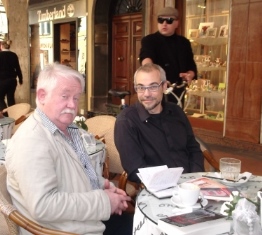
Marco has already had one book published in the UK this year, the excellent comedy crime novel Game For Five [Europa], the first in his ‘Bar Lume’ series (which is being televised in Italy), and a second follows in June: The Art of Killing Well from Maclehose.
It was little wonder then that I seemed jet-lagged and overawed when I had to sign copies of my new book, Mr Campion’s Farewell, for a delightful audience of Albert Campion fans at Heffers in Cambridge, which all civilised people know is built on the site of the venerable St Ignatius College.

Happily I was able to recover enough to make it to fashionable Goldsboro Books in London’s West End to attend the launch party for The Dead Ground, the new novel by Claire McGowan from publishers Headline.

And as my presence had been required in Italy, I was unable to attend (disgracefully for the second year running) one of my favourite publishing parties, the annual Penguin Crime bash. Fortunately those generous people at Penguin accepted my apologies and sent me their new catalogue of forthcoming crime novels, produced in the form of a deck of playing cards.

As well as being a very clever way of publicising Penguin authors and their new titles, the cards – known as Top Trumps – will provide hours of fun, if only by provoking arguments about whether a straight flush of Felix Francis’s beats two pairs of Nicci Frenches…
Go West, Old Man
I have acquired a street map of Bristol – admittedly rather an old one – in order to prepare myself for a journey into the West this month to attend, for the first time, a Crimefest convention, though I feel considerable apprehension and nervousness at the prospect of being questioned in public spectacles, or “panels”, chaired by such steely-eyed inquisitors as Mr Peter Guttridge and Mr Jake Kerridge. admittedly rather an old one – in order to prepare myself for a journey into the West this month to attend, for the first time, a Crimefest convention, though I feel considerable apprehension and nervousness at the prospect of being questioned in public spectacles, or “panels”, chaired by such steely-eyed inquisitors as Mr Peter Guttridge and Mr Jake Kerridge.
 Hopefully the bulk of the mass audiences will be attracted to some of the superstars of crime appearing at the convention such as Simon Brett, Ruth Dudley Edwards, John Harvey and David Hewson, so that my own contribution can slip by unnoticed. I do, however, intend to take advantage of one of the many attractive panels on offer, ‘Digging the Dirt’ which covers archaeology and crime writing. I will be escorting my old friend Jessica Mann there in the hope that we both might pick up a few tips. Hopefully the bulk of the mass audiences will be attracted to some of the superstars of crime appearing at the convention such as Simon Brett, Ruth Dudley Edwards, John Harvey and David Hewson, so that my own contribution can slip by unnoticed. I do, however, intend to take advantage of one of the many attractive panels on offer, ‘Digging the Dirt’ which covers archaeology and crime writing. I will be escorting my old friend Jessica Mann there in the hope that we both might pick up a few tips.
Brighton Rocks
For legal reasons I will not be participating in the new ‘Dark and Stormy’ crime festival to be held in Brighton later this month, though I was invited to the launch party.
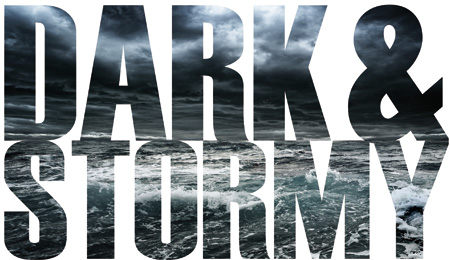
Dark & Stormy aims to be a festival combining books, films, music and theatre events and is the brain-child of Brighton authors Julia Crouch and Emlyn Rees and designer Ray Leek and takes place over the week-end commencing 23rd May. Full details can be found on http://darkandstormybrighton.org/ but I cannot resist picking out a few highlights.
Naturally, Professor Barry Forshaw will be present in his role as (it says here) “crime genre expert” and one event promises “A Myriad of Crime Writers” which at first had me in a panic as I foolishly took “myriad” – in the classical Greek sense – to mean 10,00 crime writers. It does, of course, refer to the independent Brighton-based publisher Myriad, which is establishing an impressive track record in publishing new crime writers.
One of the highlights of Dark & Stormy (which I am assured is not a reference to the weather on the sea-front) – an appearance by local bestseller Peter James – is already sold out, but had I been invited attending, I would have made a beeline for the Saturday 24th event where my old chum Sophie Hannah is to be interviewed by Julia Crouch on the intriguing topic of “Sex, Lies and Internet”.
Storyville Stomp
I must commend publishers Mantle on doing a wonderful production number on Ray Celestin’s debutthriller The Axeman’s Jazz, which is published later this month.
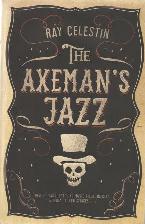 Inspired by a true story, the book rightly makes the most of its setting, that cradle of jazz New Orleans in the year 1919 and even features a young ‘Lewis’ Armstrong though I do not believe author Ray Celestin is related to Oscar ‘Papa’ Celestin, whose Tuxedo Band played in the Big Easy for almost half a century. Back in 1919, however, New Orleans was terrorised by a serial killer (the clue is in the title) who offers to spare households which demonstrate a love of jazz. Inspired by a true story, the book rightly makes the most of its setting, that cradle of jazz New Orleans in the year 1919 and even features a young ‘Lewis’ Armstrong though I do not believe author Ray Celestin is related to Oscar ‘Papa’ Celestin, whose Tuxedo Band played in the Big Easy for almost half a century. Back in 1919, however, New Orleans was terrorised by a serial killer (the clue is in the title) who offers to spare households which demonstrate a love of jazz.
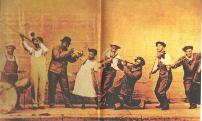
The endpapers of the book are wonderfully decorated with a famous photograph from jazz history showing cornet player Joe ‘King’ Oliver and his Creole Bandfeaturing pianist Lil Hardin (soon to be Mrs Louis Armstrong) which is charmingly evocative of the vibrant New Orleans music scene of the period. If memory serves, however, I seem to recall this particular picture was staged in a studio in San Francisco where the band toured in 1921, but who am I to nit-pick?
Home for Retired Books
Even though all the shelves in all the libraries here at Ripster Hall are already groaning under the weight of thousands of volumes, I cannot resist giving a home to unwanted crime novels when they request sanctuary. Some of these books, I admit, are not titles I would seek out, or buy, or actually read, but I cannot resist looking them over, for they all – in more ways than the obvious one – have stories to tell.
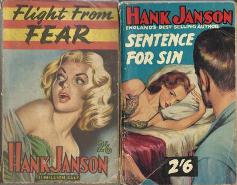
My most recent unplanned acquisition has been a pair of ‘Hank Janson’ thrillers, from the brief but notorious golden age of British pulp fiction – roughly 1946 to 1954. Although technically published, respectively, in 1958 and 1960, Flight From Fear is actually a reissue (with new title and new cover) of Janson’s 1953 thriller Pursuit, just as Sentence For Sin is a reprint (new title, new cover) of The Lady Has A Scar from 1950.
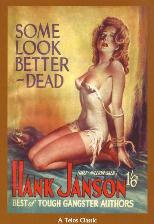 To be honest, I have never been a fan of the extensive Hank Janson canon most of which is mercifully forgotten nowadays apart from their notoriously lurid covers (by Reginald Heade) which have been faithfully reproduced in the recent Telos Publishing reprints. To be honest, I have never been a fan of the extensive Hank Janson canon most of which is mercifully forgotten nowadays apart from their notoriously lurid covers (by Reginald Heade) which have been faithfully reproduced in the recent Telos Publishing reprints.
I am, however, a great admir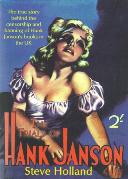 er of Steve Holland’s masterful 2004 study The Trials of Hank Janson (also from Telos), which tells the true story of how Britain’s draconian obscenity laws were used to crack down on pulp paperbacks in 1954, result in the. ..er…pulping of hundreds of thousands of copies, fines for distributors and booksellers and prison sentences for publishers. The ‘Janson’ prosecutions – which actually increased sales of Janson titles – were an immediate forerunner of the campaigns against (and for) the publication of Lady Chatterley’s Lover. The legal decisions bookmarked by Janson and Chatterley involved a number of prominent legal, political and literary figures (Mr Christmas Humphreys, Roy Jenkins, Richard Hoggart, E.M. Forster) and the end result was a lessening of censorship and, some would say, the green-lighting of the Permissive Society and the Swinging Sixties. er of Steve Holland’s masterful 2004 study The Trials of Hank Janson (also from Telos), which tells the true story of how Britain’s draconian obscenity laws were used to crack down on pulp paperbacks in 1954, result in the. ..er…pulping of hundreds of thousands of copies, fines for distributors and booksellers and prison sentences for publishers. The ‘Janson’ prosecutions – which actually increased sales of Janson titles – were an immediate forerunner of the campaigns against (and for) the publication of Lady Chatterley’s Lover. The legal decisions bookmarked by Janson and Chatterley involved a number of prominent legal, political and literary figures (Mr Christmas Humphreys, Roy Jenkins, Richard Hoggart, E.M. Forster) and the end result was a lessening of censorship and, some would say, the green-lighting of the Permissive Society and the Swinging Sixties.
The Hank Janson books mostly written by a rather odd cove called Stephen Frances (1917-1969), were certainly not great literature, not even decent crime fiction, but they have an important place in the history British literacy, culture and politics and Steve Holland’s book tells the story of their birth in the seedy post-War publishing business and the trouble they caused, with more clarity and excitement than can be found in the novels – well over 50 titles – themselves.
Curiously enough at almost exactly the same time, I received another ‘Janson’ book, but this one is a world away from lewd, faux-American gangster tales written by an English conscientious objector communist who went to live in Franco’s Spain (I told you he was odd).
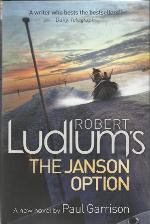 The Janson Option – or to give it its full title, Robert Ludlum’s The Janson Option – now published here by Orion, is the third in a series devised by the late Robert Ludlum but now written by Paul Garrison. The Janson Option – or to give it its full title, Robert Ludlum’s The Janson Option – now published here by Orion, is the third in a series devised by the late Robert Ludlum but now written by Paul Garrison.
Robert Ludlum was an established international bestseller five years before James Patterson published his first thriller and I believe the Ludlum ‘franchise’ was established before the Patterson one. As to be expected from such a trusted brand name, The Janson Option involves fast-moving and violent international action (from Libya to Somalia) and skullduggery on a global scale (megalomaniac oil interests) along with, as to be expected from a writer as good as Paul Garrison, a fine sense of suspense, taut dialogue and a wonderful feel for the scenes which take place on the high seas.
None of this should come as a surprise to anyone who knows that ‘Paul Garrison’ is the pen-name of my old chum Justin Scott, the author some cracking private eye novels (Hardscape and Frostline are both worth seeking out) as well as famous seafaring thrillers such as The Shipkiller. Should anyone have any qualms about me breaking the confidence of a pseudonym, my conscience is clear. This column ‘outed’ Paul Garrison several years ago. You really should have been paying attention.
|
|
By Any Other Name
Not all attempts at outing writers using pseudonyms have been successful, however, though in one case – my own – I rather wish it had.
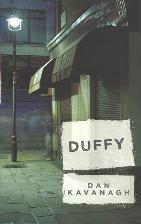 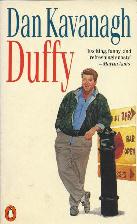
The comic thriller Duffy by ‘Dan Kavanagh’ is reissued this month by Orion, but it was the talk of the town back in 1988 when Penguin published the paperback along with three follow-up adventures featuring Nick Duffy, the ‘bisexual ex-cop turned private detective’. When my first novel was published in 1988 and nominated for the inaugural Punch Prize for comedy crime (it didn’t win), various hacks from the literary pages of national newspapers which should have known better, got it into their heads that ‘Dan Kavanagh’ – an acknowledged pen-name – was in fact me writing in disguise!
Despite my protests that I was not Kavanagh and indeed had never heard of the book Duffy, the rumours persisted until, driven to distraction, I journeyed to that Mecca of bookshops, Murder One, where Maxim Jakubowski not only sold me a copy but also confided that it was an open secret that ‘Dan Kavanagh’ was (and still is) the distinguished novelist Julian Barnes.
How different life could have been had I gone along with those misguided ‘literary critics’; I might have sustained the deception for anything up to two weeks before being rumbled – or sued. Still, I am delighted to see Duffy back in print and brought before a new audience.
Finding Gordo
It has been some years since I read one of Steven Saylor’s ‘Gordianus the Finder’ novels in his Roma Sub Rosa series, so I’m delighted to see there’s a new one out from Constable and Robinson, or C&R Crime as they seem to be known these days, Raiders of the Nile.
The year is 88BC and the Middle East is, unusually, in turmoil with a war in progress between Rome and King Mithridates VII of Pontus, whichall my readers will know is in modern-day Turkey. The young Gordianus finds himself slap-bang in the middle of hostilities in Alexandria and up to his neck in plots and stratagems when his slave Bethesda is mistaken for a rich man’s mistress and kidnapped.
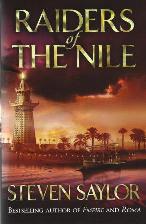
Ox Cheek?
It is not often that you see the words ‘bite-sizedchunks’, ‘rich diet’ and ‘Tuck in’ in a paragraph basically concerned with raising the awareness of the charity Oxfam. However, Ian Rankin uses them to good effect in his Introduction to the anthology OxCrimes, edited by Mark Ellingham and Peter Florence, and published by Profile Books this month.
This substantial anthology, which will surely overshadow all other anthologies this summer (not that I know of any) contains 27 crime stories – 22 of them published for the first time – by a quite stunning international cast of writers, some of whom I’ve been known to prop up a bar with, some I’ve admired from afar, many I’ve read and almost all I’ve heard of, includes: the aforementioned Mr Rankin, Val McDermid, George Pelecanos, Anthony Horowitz, Anne Zouroudi, Denise Mina, Yrsa Sigurdardottir, Fred Vargas and Stuart Neville.
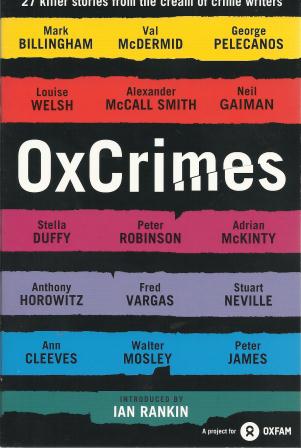
Altogether substantial, satisfying fare; and in avery good cause.
Sad Tidings from the East
I was saddened to hear – curiously enough from a colleague in Japan – of the death in Norwich of Roy Peter Martin, aged 83, the crime writer and reviewer better known under his writing names of James Melville and Hampton Charles. Particularly saddened because Peter/James did not live to see the new Ostara editions of his first three ‘Superintendent Otani’ novels back in print this week after a gap of more than thirty years, editions which I had the pleasure of editing.
 } }
Roy Peter Martin, was born in London in 1931, read philosophy at Birkbeck College and after National Service in the RAF worked in local government and then entered teaching. In 1960 he became a British Council Officer and thereafter his career was in cultural diplomacy and educational development in Indonesia, Japan and Hungary. In 1979 he returned to Japan as Head of the British Council and began to write the Superintendent Otani series of crime novels which “provided a vivid and multi-stranded portrait of Japanese society, caught between its traditional (and often hidebound) past and the exigencies of modern life”. He also wrote historical novels set in Japan and spy novels which drew on his experiences in Indonesia and Hungary.
Under the pen-name Hampton Charles, he continued the ‘Miss Seeton’ series of stories (gentle parodies of Agatha Christie’s Miss Marple books) originally written by Heron Carvic (1913-1980). He was a noted reviewer of crime fiction for the Hampstead & Highgate Express and also a member of the Detection Club, but will probably be best remembered for his creation of the thoughtful, mild-mannered Japanese detective Tetsuo Otani, who made his debut in The Wages of Zen in 1979 and went on to feature in a dozen more novels.
  
Between the Wood and the Water
Even the most radical and innovative (not say violent and dark) chroniclers of urban crime have to retire some time – and where better to relax than that fine county of Norfolk? Even so, it would be surprising if the crime writer who made such a stunning debut in 1995 with Vinnie Got Blown Away actually sat back and put his feet up.
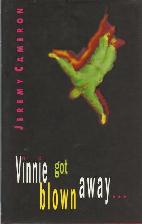 
Thankfully the last thing Jeremy Cameron did was put his feet up and his latest book, Never Again, is the story of how he walked from the Hook of Holland to Istanbul (or Constantinople as I knew it) in an attempt to emulate the late Patrick Leigh Fermor who did it in 1933 and was, as Jeremy says, ‘a good deal more heroic’.
I happen to know that on his travels, Jeremy met at least one character who was to become a crime writer and I would lay odds that he observed several more who could easily have featured in his own distinctive brand of inner city noir which he honed to fictional perfection after years as a Probation Officer in darkest Walthamstow.
Never Again is published by Signal Books and is available on Amazon at http://www.amazon.co.uk/Never-Again-Walk-Holland-Istanbul/dp/1908493968/ref=sr_1_1?ie=UTF8&qid=1398717483&sr=8-1&keywords=jeremy+cameron+never+again
At the Coalface
John Harvey is a writer who has been ‘at the coalface’ (an expression often used in the past, when Britain had coal mines) of intelligent popular fiction for many years and a prominent force in crime-writing since his first Inspector Resnick book in 1989.
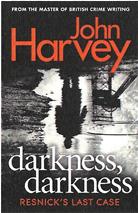
In his new novel Darkness, Darkness, published by Heinemann this month, he takes us literally to the coalface – or at least the pit-heads of the Nottinghamshire coal fields during the turbulent Miners’ Strike of the 1980s. This is a cold case for Resnick, who is of an age where he will consider anything rather than face the prospect of a stair-lift, helping with the investigation of a woman murdered at the time of the Strike but whose body has only just been unearthed. What Resnick (and Harvey) is so good at though, is observing an ensemble cast of police officers on and off duty, taking pride and occasionally prejudice in their work.
If this is the last Resnick novel, as is claimed, he will be much mourned (but – Spoiler Alert – he does not die!) and Darkness, Darkness is already a very strong candidate for anyone’s crime novel of the year. I am personally grateful to the book for reminding me of the rather incongruous address of Wakefield’s maximum security prison – Love Lane – once the scene of an audacious escape attempt by helicopter and for painting a portrait of an almost forgotten age of divided and traumatised mining communities, something which has not been done as well since Reginald Hill’s Underworld in 1988.
Going Global
New releases show, if such a thing needed showing, that crime fiction really is a global force, with every point on the compass ripe for a satisfying murder mystery.
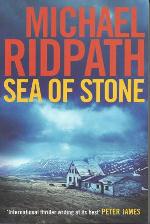 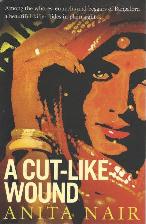
To give just one example of geographical extremes, two new titles this month choose settings as far apart as Iceland and Bangalore (sometimes known as ‘India’s Silicon Valley’). Michael Ridpath cements his reputation as one of my favourite writers of Nordic Noir in Sea of Stone published by Corvus, whilst Indian novelist and journalist Anita Nair turns to crime fiction for the first time with A Cut-Like Wound, from Bitter Lemon Press, which introduces Inspector Borei Gowda. It seems that Inspector Gowda has been an instant hit with the crime reviewer for the Hindustan Times who wrote that Anita Nair should really hurry up with a sequel as ‘It’s torture to wait two years for any man; it’s even worse if he’s as interesting as Inspector Borei Gowda’.
Pushing the geographical boundaries even further – to within the Arctic Circle – is Tom Harper with his new thriller Zodiac Station, which is coming from Hodder in June. Involving a remote scientific research centre, an ice-breaking rescue mission, ice caves, murder and explosions, I am confident that the book will also one day feature in a pub quiz somewhere: Name two thrillers set in the Arctic which contain the word ‘Station’ and the letter ‘Z’…
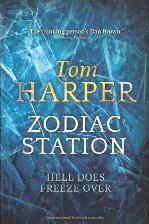 
Continuations, Continuations
There has been much talk lately of ‘continuationfiction’ (and there will be more at Crimefest) where famous characters from the past are revived and given a new lease of life by new authors – James Bond, Philip Marlowe, DrJohn Watson (and of course Sherlock Holmes), Lord Peter Wimsey, Albert Campion and soon Hercule Poirot. Now ‘continuation fiction’ is neither restricted to crime writing nor a new phenomenon and I have recently come across an example from 1993 where that exemplary American mystery writer and editor Ed Gorman turned his talented hand to continuing the adventures of a crime-fighting icon and seemingly crossing genres in the process:
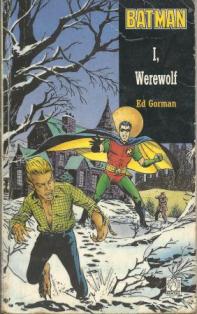
Pip! Pip!
The Ripster
GAWM90.pdf
|